Howard Andrew Jones's Blog, page 74
March 12, 2013
Pedal to the Paizo
I have lots of cool things on my radar, but my blog is apt to be quiet for a bit. There are only a few weeks left before I’m to turn over my second Paizo Pathfinder novel. The rough (in some spots, very rough — like, still needing sanding and primer paint) draft is through and now I’m tightening things up, heightening some description, improving some character moments, etc. I’m liable to be working night and day until that’s all over, which means I won’t have time to play around online.
I know a lot of authors prefer the rough draft process, but, maybe because of all my years as an editor, it’s the outlining stage and the editing stage I actually like the best. Once everything is on the page and the arcs and motivations are in place I can better see exactly what needs to be done.
The tentative title is now Stalking the Beast. I’ve been brainstorming some cover concepts with Paizo’s James Sutter; the new book will probably have a picture of Elyana Sadrastis wailing away on some kind of beastie, because she’s pretty good at that. No dragon this time, though.
Right. Now to breakfast, then to feed horses, then writing/revising.
March 7, 2013
Link Day
 Writing advice is plentiful and so cheap it’s, well, free. But every now and then I stumble upon some well-written counsel. I found some the other day and thought I’d pass it along.
Writing advice is plentiful and so cheap it’s, well, free. But every now and then I stumble upon some well-written counsel. I found some the other day and thought I’d pass it along.
I know little about Teresa Frohock other than what can be found on her About page, but I was much impressed by the words of wisdom she offered to debut author Zachary Jernigan. Follow this link to read ten fine points for new and aspiring writers.
Apparently Thursdays are Link days, because I stumbled on two other interesting articles I wanted to pass along. The first is all about how brainless slime molds navigate mazes. Let me restate that. These are things that don’t have brains, yet they are making decisions. It’s a quick and interesting read.
And now for a read that’s not quick but still very interesting, an in-depth look at some modern philosophers. Wait — before your eyes glaze over, these fellows are contemplating the future of the human race, extraterrestrial intelligence, and all sorts of fascinating stuff. Here, rather than summarizing, I will quote its author, Ross Andersen, directly. The article is definitely worth your time.
In the past decade alone, science has discovered that planets are ubiquitous in our galaxy, and that Earth is younger than most of them. If the Milky Way contains multitudes of warm, watery worlds, many with a billion-year head start on Earth, then it should have already spawned a civilisation capable of spreading across it. But so far, there’s no sign of one. No advanced civilisation has visited us, and no impressive feats of macro-engineering shine out from our galaxy’s depths. Instead, when we turn our telescopes skyward, we see only dead matter, sculpted into natural shapes, by the inanimate processes described by physics.
Robin Hanson, a research associate at the Future of Humanity Institute, says there must be something about the universe, or about life itself, that stops planets from generating galaxy-colonising civilisations. There must be a ‘great filter’, he says, an insurmountable barrier that sits somewhere on the line between dead matter and cosmic transcendence.
Before coming to Oxford, I had lunch with Hanson in Washington DC. He explained to me that the filter could be any number of things, or a combination of them. It could be that life itself is scarce, or it could be that microbes seldom stumble onto sexual reproduction. Single-celled organisms could be common in the universe, but Cambrian explosions rare. That, or maybe Tsiolkovsky misjudged human destiny. Maybe he underestimated the difficulty of interstellar travel. Or maybe technologically advanced civilisations choose not to expand into the galaxy, or do so invisibly, for reasons we do not yet understand. Or maybe, something more sinister is going on. Maybe quick extinction is the destiny of all intelligent life.
Humanity has already slipped through a number of these potential filters, but not all of them. Some lie ahead of us in the gauntlet of time. The identity of the filter is less important to Bostrom than its timing, its position in our past or in our future. For if it lies in our future, there could be an extinction risk waiting for us that we cannot anticipate, or to which anticipation makes no difference. There could be an inevitable technological development that renders intelligent life self-annihilating, or some periodic, catastrophic event in nature that empirical science cannot predict.
Ross Andersen’s article can be fount in its entirety over at Aeon.
March 5, 2013
The Perfect REH Collection
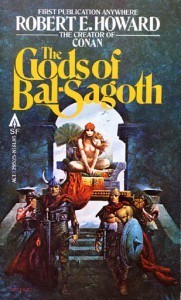 If you’re not a Robert E. Howard fan, then there’s probably not much point in reading this post any further, unless you’re simply curious. If you’ve found that you don’t like REH’s work, though, there’s nothing to see here, so move along. Shoo.
If you’re not a Robert E. Howard fan, then there’s probably not much point in reading this post any further, unless you’re simply curious. If you’ve found that you don’t like REH’s work, though, there’s nothing to see here, so move along. Shoo.
Alright, so now I’m probably mostly sharing this with fans of the stylings of REH, so you probably know that there is, finally, a wealth of material by the man to choose from in print today. For a guy who died so young he was incredibly prolific. I’ve read most of his work several times, and there’s some of it I’ll keep re-reading. Others of it, though, I won’t. For instance, Almuric. Or “The God in the Bowl.” Read it. No second helping required.
I have a long shelf of REH, including a bunch of beat up old paperbacks, all those lovely Del Reys (including the two volume best of), and Conan’s Brethren, which is sort of a “best of” featuring a whole bunch of non-Conan adventure stories. Yet as I look up at that shelf from time to time I think about which stories I would include in my very own Best Of collection.
For starters, I’d want it in one volume. And much as I enjoy and appreciate some of the stories in other genres Howard wrote for, it’s his adventure stories that really tick my clock. I don’t read and re-read “Pigeons From Hell” every few years but I darned well pull down Howard’s historicals with some frequency, or his James Allison tales, or “The Gray God Passes.” And a lot of Conan. You get the idea.
Stephen Jones’ book Conan’s Brethren comes really close to being my best of volume, but it’s a little heavy on Solomon Kane. Much as I like Kane in concept, there’s only one or two that I re-read. Howard was a younger writer when he came up with Kane, and it shows, because a lot of the plots are a little thin. There are a few other selections I’d change to make more space — Jones includes “The Lost Race” in amongst the Bran Mak Morn section, which is pretty weak, but leaves out “By This Axe I Rule” from the King Kull section, which is among the best Kull adventures, and, in my opinion, better than the Conan re-tread “The Phoenix on the Sword.” And Jones, possibly in an attempt to showcase Robert E. Howard’s range, chews up a bunch of space with Almuric and then throws in “The Frost King’s Daughter” which, by any other name, is still one of the weaker Conan (Amra) stories.
(Pardon this aside, but it’s just a little weird talking about one guy named Howard and another one named Jones when THOSE ARE MY OWN NAMES.)
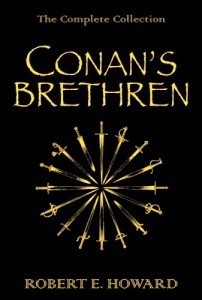 On the other hand, Jones grabs ALMOST all of the best historicals, even including “Gates of Empire,” a personal favorite of mine. He includes “The Gods of Bal-Sagoth,” a more obscure entry that I always enjoyed, and then picks the two best James Allison stories, “The Valley of the Worm” and “The Garden of Fear.” I would have replaced “Hawks of Outremer” with “The Road of Azrael,” which I vastly prefer, but some people do seem to like Cormac Fitzgeoffrey (I always thought the best Fitzgeoffrey story was the one REH DIDN’T finish writing).
On the other hand, Jones grabs ALMOST all of the best historicals, even including “Gates of Empire,” a personal favorite of mine. He includes “The Gods of Bal-Sagoth,” a more obscure entry that I always enjoyed, and then picks the two best James Allison stories, “The Valley of the Worm” and “The Garden of Fear.” I would have replaced “Hawks of Outremer” with “The Road of Azrael,” which I vastly prefer, but some people do seem to like Cormac Fitzgeoffrey (I always thought the best Fitzgeoffrey story was the one REH DIDN’T finish writing).
I criticize, but some of my criticism comes down to personal taste. Jones was probably trying to showcase a little from all of Howard’s best known heroes, apart from Conan. He made plenty of great choices in the collection, and if I weren’t a couple days drive from any body of water (apart from The Sea of Monsters) Conan’s Brethren would be a good beach read.
Still, maybe it’s my years as an editor talking, but I can’t help thinking about what I’d want to see in a one volume REH best of. I wonder if I could put one together and just print ONE copy via Lulu (because I don’t own a Nook, Kindle, or Kook, or Nindle) just for meself. If I’m ever not under a looming deadline and various home crisis, maybe…
If you were to put a collection of the best REH adventure stories together, including Conan, what would you include? Poetry counts as well. I loves me some good Robert E. Howard poetry.
I’ll start putting my own list together this week, and I’ll be curious to hear other thoughts. Please don’t try to convince me that “The God in the Bowl” or “The Lost Race” are actual masterpieces, though, or that I’m not giving Fitzgeoffrey a fair shake. If you enjoy ‘em, great. REH would be happy.
March 3, 2013
Step One
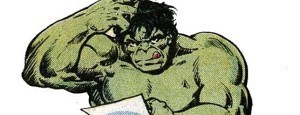 I had been writing fantasy and science fiction for years before it finally dawned on me that if I was really serious about it I really ought to understand its roots. This was some time in my late 20s, right before the birth of my first child. For many years I threw myself into an exploration of great or influential (occasionally both) and frequently obscure fantasy fiction from the mothers and fathers of fantasy. I dove deep, and by the time I came up for air I had learned an awful lot. I do recommend understanding the ground on which we stand so that writers can better understand how to move forward.
I had been writing fantasy and science fiction for years before it finally dawned on me that if I was really serious about it I really ought to understand its roots. This was some time in my late 20s, right before the birth of my first child. For many years I threw myself into an exploration of great or influential (occasionally both) and frequently obscure fantasy fiction from the mothers and fathers of fantasy. I dove deep, and by the time I came up for air I had learned an awful lot. I do recommend understanding the ground on which we stand so that writers can better understand how to move forward.
However, I recently realized that while I was reading all that old stuff– some of which was cool, a little of which I loved so much I moved it to my favorites list, and a lot of which was turgid or simply not my cuppa — I was NOT reading a whole generation of literature that had a tremendous influence on a lot of my peers writing today. For instance, I missed out on the whole Robert Jordan thing. By the time I was through with my scholarly investigations, word was out that Jordan had begun to stretch those middle volumes, so I never dipped in.It might be that I would have gotten hooked enough that I’d be frantically reading the Sanderson/Jordan volumes like many of the rest of you.
Me, I still like books that feel like a movie in length. However, I don’t think that’s what the fantasy book buying public wants these days. They want a book that feels like a miniseries. You have only to look at the bestselling adult fantasy series to see this. Almost all of them are weighty tomes. Now that I’m looking at the evidence it’s incredibly obvious. It was made even more obvious to me at Worldcon 2012, when I was manning the Black Gate booth. A woman dropped by to look at the thick, gorgeous editions of the magazine, each featuring a colorful and striking cover.
“What’s this?” She asked, obviously attracted by the heft and professional look of the mag. When I told her that it was a collection of short stories she immediately sat it down. “I only like big fantasy novels that I can really lose myself in,” she said, then thanked me and walked off. It wasn’t the first time I’d heard something like that, but it was the first time it really stuck with me.
If I am to make a career of this whole thing, I need to find a way to provide what the audience wants while at the same time pleasing my own storytelling muse (if I’m not enjoying what I’m writing, I have a hard time believing it can be any good). Step one has been reading a lot of the most popular fantasy series so I can see how true masters of their craft can spin long yarns. I’ve been taking a lot of notes…
February 27, 2013
Golden Juicebox
 I just learned the other day that I’d been awarded a Juicebox from Staffer’s Book Review, specifically for the best book Justin Landon had read in 2012 that wasn’t FROM 2012. Among other things, Landon wrote this about The Desert of Souls:
I just learned the other day that I’d been awarded a Juicebox from Staffer’s Book Review, specifically for the best book Justin Landon had read in 2012 that wasn’t FROM 2012. Among other things, Landon wrote this about The Desert of Souls:
By embracing that past, infused with Arabian Nights and early 20th century fantasy, Jones captures what is best about outmoded forms of fiction without any of the of negative trappings. Many will call Howard Andrew Jones a writer of historical adventure fantasy. It’s an accurate description, but one that sells him woefully short. Desert of Souls is a masterful novel that resonates on a meta-fictional level that’s rarely equaled. I cannot recommend it highly enough.
That made my day.
In other news, I am still riding across Golarion, righting wrongs, slaying past participles, and editing the second novel-length adventure of Elyana Sedrastis. It’s taking most of my focus, but I am unable to resist more and more brainstorming on some secondary world fantasy ideas that are percolating so nicely I may have to put them on the front burner.
I still haven’t decided whether I can make it to WorldCon this year, but I’m definitely looking forward to being at GenCon. The writer’s track there is looking to be even more interesting than it was last time.
February 22, 2013
Pathfinder at Work
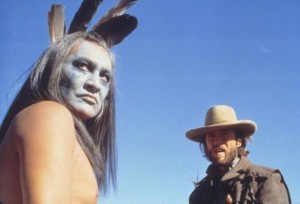 Right now I’m still cooking away at my newest Paizo novel. I was nearing the conclusion when I decided my time would better be spent shoring up all that came before, and after a week of this I’m getting more and more happy with the result. I’m pretty sure that anyone who enjoyed the first one, Plague of Shadows, will like this one even more.
Right now I’m still cooking away at my newest Paizo novel. I was nearing the conclusion when I decided my time would better be spent shoring up all that came before, and after a week of this I’m getting more and more happy with the result. I’m pretty sure that anyone who enjoyed the first one, Plague of Shadows, will like this one even more.
It being crunch time for this book, I’m not working on much else, although I haven’t been able to resist spending a little time on proposals for some pretty exciting secondary world fantasy novels. Some of you may not want to hear this, but thinking about settings that won’t require a whole slew of research (either via history books or gaming books) to bring to life is starting to feel quite liberating. Instead of worrying that I’ll have missed some key point of ancient Middle-Eastern culture or left out some important Baghdad landmark, I might just be able to make something up.
You might be wondering why I have another pic of Ten Bears on my blog. Merely because the conversation between Ten Bears and Josey Wales is one of my very favorite moments on film.
Right, well, that’s about all I’ve got. I’ve been re-exploring some of my favorite Robert E. Howard stories, and I’ll have some notes about those in the next week.
February 17, 2013
Two More Things
 I’m deep in draft mode these days, but I wanted to swing in with a couple of recommendations.
I’m deep in draft mode these days, but I wanted to swing in with a couple of recommendations.
First, I wanted to point everyone over to a new book trailer from the talented Alex Ross, something from his new fantasy series, coming in June from Tor. Take a look by clicking here.
Second, the gifted Jon Sprunk is running a book giveaway over at Goodreads through the end of March. If you’ve been curious about his work, now’s your chance to try it out… or at least to try for a chance to try it out. Follow this link to enter.
In the next couple of days I’ll post a link to some great sword-and-sorcery stories. For now, though, I must away!
February 14, 2013
Invocation of the Muses
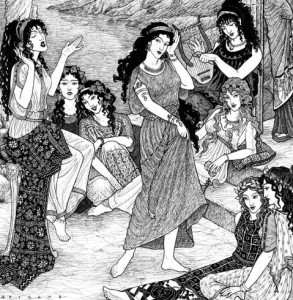
Thalia Took’s Sketch of 9 Greek Muses
One of Steven Pressfield’s main topics of focus in The War of Art is the fight against what he calls Resistance — the unrelenting struggle a writer faces to NOT write. Every day a writer has to push forward and make the writing happen. You just can’t wait for inspiration, at least not if you’re going to write professionally.
I’ve found that The War of Art is one of the most useful writing books I’ve ever read because of its description of and advice about waging the battle against Resistance (note the capital R — you must respect the enemy). To help me do battle, one of my tactics is to recognize that when you sit down to write you’re entering a different kind of mental state. I tell writing students that just as a professional athlete would not simply arrive at the track field and start sprinting, a writer will be poorly served to jump into the seat and immediately start typing.
It’s my thought that you have to acknowledge that change, that transition from one mental state (where you’re worrying about groceries and laundry or that news article) to another where the story is all, in order to do good work.
On the first page of The War of Art, Pressfield describes what he does each day to prepare to write so that he can be in the proper frame. Amongst several other personal rituals, Pressfield says a prayer. His is the Invocation of the Muse from Homer’s Odyssey, translated by T.E. Lawrence (that’s Lawrence of Arabia, incidentally).
I’ve never been much of a praying man myself, but I liked the sound of this, so I looked up the prayer, which I had read as a school boy and probably blipped over:
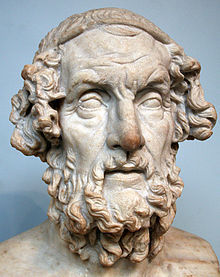 O Divine Poesy
O Divine Poesy
Goddess-daughter of Zeus,
Sustain for me
This song of the various-minded man,
Who after he had plundered
The innermost citadel of hallowed Troy
Was made to stray grievously
About the coasts of men,
The sport of their customs good or bad,
While his heart
Through all the seafaring
Ached in an agony to redeem himself
And bring his company safe home.
Vain hope – for them!
For his fellows he strove in vain,
Their own witlessness cast them away;
The fools,
To destroy for meat
The oxen of the most exalted sun!
Wherefore the sun-god blotted out
The day of their return.
Make the tale live for us
In all its many bearings,
O Muse.
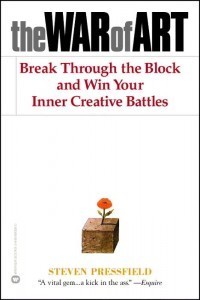 That’s glorious. I love it. Even though I do not think of the Muses as deities but as personifications of a state of mind that an artist must tap, I thought acknowledging the Muses with a sort of prayer would be an excellent acknowledgment of the transitional moment.
That’s glorious. I love it. Even though I do not think of the Muses as deities but as personifications of a state of mind that an artist must tap, I thought acknowledging the Muses with a sort of prayer would be an excellent acknowledgment of the transitional moment.
But I found a problem with the above prayer. Not with its language, but with its highly specific focus. When I tried to speak it, I was brought immediately to mind of someone else’s story. Odysseus, naturally. I wanted a prayer to the Muses that was not necessarily aimed at the telling of one of Homer’s great works.
So I penned one myself. It does not approach the glory of the prayer created by one of the world’s greatest writers, but it is a prayer with words that speak for me.
The odd thing is that once I say the prayer, I feel like the matters I’m about to craft are more serious, and so I am far less tempted to check my e-mail or FB or Tweet or what have you. I’m all about the work.
I say again that I do not believe in Muses watching over us. But I do believe we must acknowledge and try to understand the creative spirit within us if we are to work with it to bring out our best work.
So, with that preamble, here’s my prayer to the Muses:
Invocation to the Muses
(Howard Andrew Jones)
Muses, I praise thee.
Grant me the vision to craft words of power that sear into the mind’s eye.
Let my ears hear words that are true and pure.
Let my inspiration be a mighty steed that carries me forward.
I pledge to you that I shall fight Resistance and strive to bring glory to the tales you would have me tell.
Let the work begin.
February 12, 2013
Plague of Titles
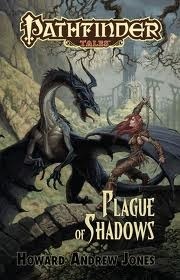 I thought I’d pen a quick note just so everyone knew I was still alive. There’s a lot of activity here at Jones central, and some of it is related to the fact I have a looming deadline.
I thought I’d pen a quick note just so everyone knew I was still alive. There’s a lot of activity here at Jones central, and some of it is related to the fact I have a looming deadline.
The final stages of the official The Bones of The Old Ones launch campaign are wrapping up. In just a little while I’ll be promoting The Desert of Soul’s official paperback UK release, but in between now and then I’m working away on my next Paizo Pathfinder book. I’m on the final stages of the first draft of whatever the sequel to Plague of Shadows is going to be called.
The fact that I don’t have a title yet bugs me. Usually the title is one of the first things to reach me. For instance, I knew that The Bones of the Old Ones would be titled that after the first few chapters were written, no matter that the entire text was heavily revised several times. The Desert of Souls had a title almost from the first line. But so far a title for Elyana’s next adventure eludes me. All I know for sure is that it really can’t have anything to do with Plague or Shadows and probably shouldn’t have an “of” construction because A.) I’ve been doing that a lot and B.) Paizo has a lot of “of” titles.
Hopefully something will occur to me as I finish and go back through!
I’ve been revisiting Pressfield’s The War of Art and have a few observations about it I mean to share, but I’ve got to get to some writing.
February 2, 2013
Dabir and Asim in England

Prehistoric Groundhog
Whew! What a busy January that was.
I’m hoping February will be a little more… forgiving.
I’m just about to head out and look for groundhogs this morning, but I wanted to share something I thought was pretty cool. Head of Zeus, my British publisher, is putting finishing touches on their 2013 catalog, and I absolutely love their write-up of The Chronicles of Sword & Sand (aka the adventures of Dabir and Asim) so I thought I’d reproduce it here for your viewing pleasure.
Baghdad, AD 790: Caliph Harun al-Rashid presides over the greatest metropolis on Earth, ruler of an empire that stretches from China to Byzantium. His exploits will be recorded in Alf Layla or, as we know it, The Book of One Thousand and One Nights.
However, The Thousand and One Nights are silent on the deeds and adventures that befell two of the Caliph’s subjects: the renowned scholar Dabir ibn Kahlil, and his shield and right hand, Asim el Abbas. For their story, we must turn to The Chronicles of Sword and Sand…
The Chronicles tell of necromancers and the walking dead, of djinn and demi-gods, of vengeful spirits and ancient magi and the unbreakable bond of friendship between the two men who faced them all.
The Desert of Souls is being released in England in April, and The Bones of the Old Ones comes out in August, with stories from The Waters of Eternity being released in October. Head of Zeus can be found here.
Howard Andrew Jones's Blog
- Howard Andrew Jones's profile
- 368 followers



